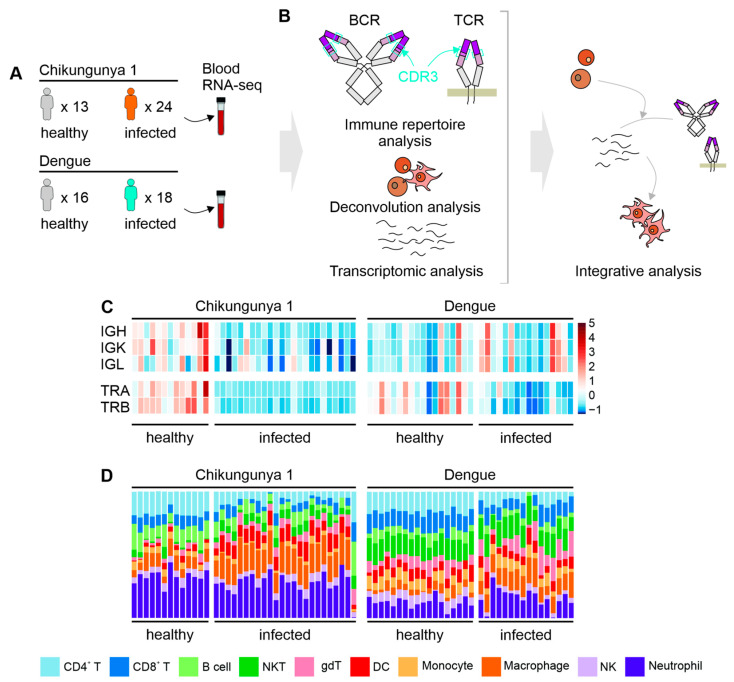Chikungunya-Driven Gene Expression Linked to Osteoclast Survival and Chronic Arthralgia.
Chikungunya fever (CHIKF), caused by the Chikungunya virus (CHIKV), manifests as acute febrile illness often associated with polyarthritis and polyarthralgia. Although the acute symptoms resolve within two weeks, many patients experience prolonged joint pain and inflammation, resembling rheumatoid arthritis (RA). This study aimed to identify molecular markers related to joint pain and chronicity in CHIKV-infected individuals by analyzing blood transcriptomes using bulk RNA sequencing. B- and T-cell receptor (BCR and TCR) diversity was assessed through computational analysis of RNA-seq data, revealing a significant reduction in CDR3 diversity in CHIKV-infected individuals compared to healthy controls. This reduced diversity was associated with the upregulation of genes involved in osteoclast differentiation and activation, particularly through the RANK/RANKL signaling pathway. These findings suggest a potential link between immune dysregulation and enhanced osteoclast activity, which may contribute to the persistence of joint pain in chronic CHIKF. Targeting osteoclast-related pathways could offer therapeutic strategies for managing chronic symptoms in CHIKF patients.
Authors
Urbanski AH, Maso VE, Martins FM, da Costa-Martins AG
External link
Publication Year
Publication Journal
Associeted Project
Systems Immunology of Human Diseases
Lista de serviços
-
RASL11A, member of a novel small monomeric GTPase gene family, is down-regulated in prostate tumors.RASL11A, member of a novel small monomeric GTPase gene family, is down-regulated in prostate tumors.
-
Splice variants of TLE family genes and up-regulation of a TLE3 isoform in prostate tumors.Splice variants of TLE family genes and up-regulation of a TLE3 isoform in prostate tumors.
-
Concepts on Microarray Design for Genome and Transcriptome AnalysesConcepts on Microarray Design for Genome and Transcriptome Analyses
-
The iron stimulon of Xylella fastidiosa includes genes for type IV pilus and colicin V-like bacteriocins.The iron stimulon of Xylella fastidiosa includes genes for type IV pilus and colicin V-like bacteriocins.
-
Origins of the Xylella fastidiosa prophage-like regions and their impact in genome differentiation.Origins of the Xylella fastidiosa prophage-like regions and their impact in genome differentiation.
-
The role of prophage in plant-pathogenic bacteria.The role of prophage in plant-pathogenic bacteria.
-
Genetic control of immune response and susceptibility to infectious diseases.Genetic control of immune response and susceptibility to infectious diseases.
-
Building capacity for advances in tuberculosis research; proceedings of the third RePORT international meeting.Building capacity for advances in tuberculosis research; proceedings of the third RePORT international meeting.
-
São Paulo School of Advanced Sciences on Vaccines: an overview.São Paulo School of Advanced Sciences on Vaccines: an overview.
-
A reasonable request for true data sharing.A reasonable request for true data sharing.

